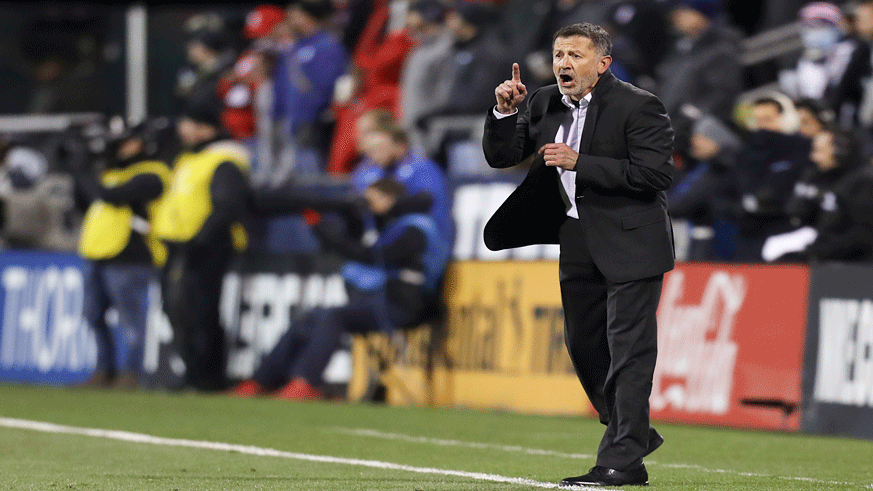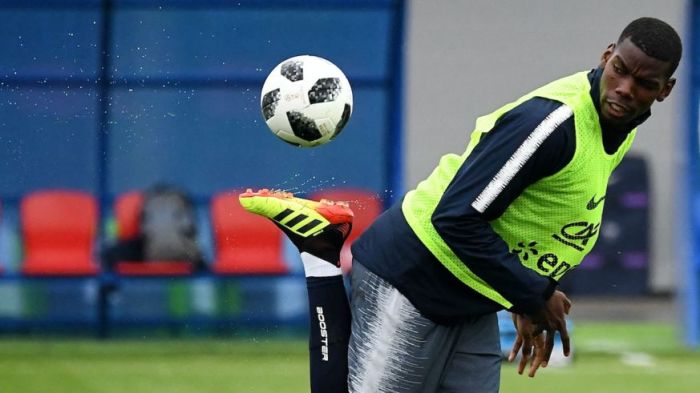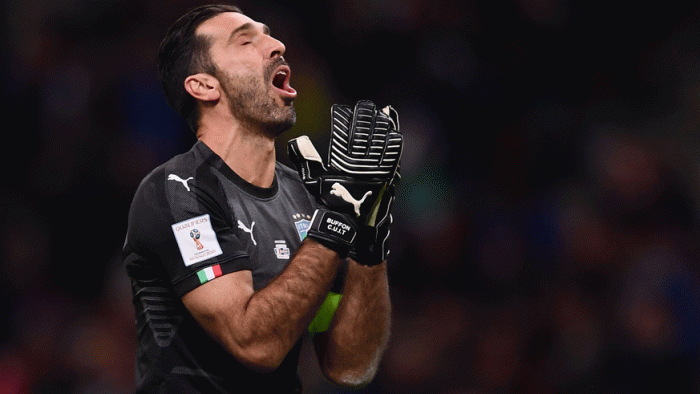Juan Carlos Osorio was recently renovating the library in his house and came across dozens of pages of old notes he took two decades ago while watching Liverpool practice. They were thoughts and observations he wrote down while secretly spying on the famed English soccer club as they trained behind closed doors.
If it sounds like cloak-and-dagger stuff, well, it sort of is. Moreover, those notes taken while watching one of the best teams in Europe train every day became the foundation for Osorio’s pedigree. The Mexican national team coach is still furiously writing notes, 20 years later, as he has El Tri poised for World Cup 2018 qualification.
It was 1996 and Osorio was a masters student at Liverpool’s John Moores University. Upon his arrival in England, the first thing he did was to try and find the team’s training facility to watch the Reds practice, something he said was “impossible,” as guests were not permitted to enter the grounds.
So he pondered, coming up with a plan that he thought was the next best thing.
Osorio rented an apartment above the team’s practice facility, one with a full view of everything going on.
There he got to watch, sometimes using binoculars when it rained, Roy Evans and then Gerard Houllier as they managed Liverpool in 1997 and 1998.
“Both of them had different ideas on how to coach. For me, it was very beneficial to watch them, study them,” Osorio told Metro in an exclusive interview. “I could watch everything.”
Not just watch, but he took notes on everything, voluminous amounts.
Osorio credits those hundreds of hours peering out a window, watching those sessions as something that helped develop his own philosophy of management.
It is a way of doing things that took him from being a former coach of the New York Red Bulls in 2009, to coaching stints at clubs in Mexico, Colombia and eventually Brazil before being appointed head coach of the Mexican national team in 2015.
His story with United States soccer goes beyond his couple of seasons with the Red Bulls. For a few seasons beginning in 1996, he was an assistant coach with the Staten Island Vipers before moving to England to obtain his master’s in science and football. He returned, with the knowledge from covertly watching those Liverpool sessions, to become an assistant coach in 2000 with the New York/New Jersey MetroStars, serving on the staff of Octavio Zambrano.
In 2001, an offer from Manchester City came to join their staff, a role he’d assume for several years until returning to MLS in 2006 as head coach of the Chicago Fire. He then spent less than two seasons in New York with varying success.
That 2008 Red Bulls team made the only MLS Cup appearance in franchise history, making a dramatic playoff run before falling 2-1 in the final to the Columbus Crew. He called that squad a “very competitive team, athletic.”
“That strengthened me in many ways our belief, the way we trained, the games and various, specific game-related situations,” Osorio said. “It was a very young team, perhaps inexperienced. Although we knew those facts against us, we made it to the final. It was all due to the training, the repetition.”
Combined with the skilled players on the roster, there were heightened expectations for the team to take a step forward.
Instead, the club suffered one of the worst seasons in league history, finishing with a 5-19-6 record.
He was fired.
It was a rough and rocky road, one that seemed destined to be the end of his career as a head coach.
He left New York and the Red Bulls but not before taking his notes from the experience with him in his next stops in Latin America. Even in a season as bad as 2009 was in New York for him, he never stopped taking notes.
Mexico’s World Cup aspirations
There’s plenty to be excited about when it comes to Mexico with a golden generation of players, many of whom are testing themselves in top leagues in Europe as well as the top-flite in Mexico.
Osorio doesn’t watch soccer opinion programs or read about the sport online or in the newspaper, perhaps viewing it as a waste of time. Instead, he dedicates himself to watching games, sometimes dozens of them in a week. It is part of the reason why he is still taking notes as he watches potential players for the Mexican national team or upcoming opponents.
Prior to a World Cup qualifier, for example, he says he’ll digest roughly 20 games of an opponent before he gathers his team from different leagues across the globe.
The job, for this self-admitted soccer, or rather futbol nut, is a dream job. But the passion of Mexican fans has impressed him, something that is easily noticeable with the way they routinely fill up the famed Azteca Stadium in Mexico City with crowds north of six figures cramming into the aging venue.
After stints in Colombia and Brazil as a young player, Osorio would emigrate to the United States in 1995 and wound up playing soccer and getting his bachelor’s degree from New Haven.
It is a most unusual path for a world soccer coach to follow, from playing in South America to college soccer in the United States, but the man known for tinkering has picked up plenty in his stops throughout the world, from Liverpool to Staten Island and now in a country that is seemingly obsessed with the sport.
Very few countries can rival Mexico for passion but also pressure when it comes to la Selección.
He admits to being surprised “that the job is 24/7.” The fan presence is incredible both in Mexico and transplanted fans in the United States. They show up hours before the match, cheer loudly and whistle and jeer openly when the team fails to meet their oft-inflated expectations.
Victory isn’t enough in Mexico. They are expected to dominate the region, something that has been in short supply in recent years as the United States has eclipsed them at times. Wins are a must and they must play a certain way: a free-flowing style of possession as the “Oles!” stream down from their supporters.
It makes for a pressure cooker of a job, one where a couple of bad matches could easily lead Osorio to pack up his notebooks and clear out his desk because he got fired.
That hasn’t been the case, so far, as his team is flying high.
After struggling to qualify for the World Cup in Brazil four years ago, Osorio has Mexico playing well. Yes, there was a hiccup last summer in the Copa America, but right now, El Tri is atop CONCACAF World Cup qualifying. They also beat the old foe, the United States, 2-1 early on in the cycle.
They are virtual locks to qualify at this juncture and are only improving in his third year at the helm.
In late May they play Croatia at the Los Angeles Coliseum and then Ireland at MetLife Stadium in the Meadowlands a few days later.
He agrees that this Mexican team could be poised for great things; no Mexican side has ever won the World Cup and this team might represent their best chance to do so next summer.
“I do think so, I agree. I think fortunately we have 14 players abroad, 13 in Europe and one in MLS,” Osorio said. “Hopefully between now and the World Cup, that will improve, that will increase. And we’ll have a stronger national team capable of playing anyone.”
Football without borders
That old foe, the United States, has been the superior national team in recent years. Part of their success over the past decade has been the steady improvement of MLS.
When Osorio was an assistant coach in this league and then a head coach, the stars of MLS were aging South American and European players, entertaining but past their prime a bit.
Now the league has trended younger and is spending major money on not just internationals in their prime, but getting American players such as Clint Dempsey, Jozy Altidore, Michael Bradley and Tim Howard from top European leagues.
They are even targeting Mexican national team members as Rafa Marquez is a former New York Red Bull and the Los Angeles Galaxy are currently paced by Giovani dos Santos.
More might be coming as Chicharito could join Los Angeles FC in time for the 2018 season. Big money is being spent in MLS, luring Mexican players away from more competitive leagues.
Past comments from Osorio have been taken to be slights at MLS, spun to imply that he wants his stars not playing in the still fledgling league.
Not so says the notebook maestro.
“I think as I’ve stated before, I want to be very clear about that. I respect this country deeply. I am very thankful because I went to university here, I studied here, I played my football here,” Osorio said.
“I do think MLS is a very reputable league. I think the changes with the age of the franchise players, even more so it is showing that it is moving into a direction. In my humble opinion, this league should be followed by the whole world; I think there are 23 teams now or 22 with a lot of beautiful, wonderful, very well-built soccer stadiums with the fans close to the players, creating an atmosphere that is second to none.
“If you add to that the ability of the young players coming in, I think in the very near future it will be a better league. It is making the progress already.”
























